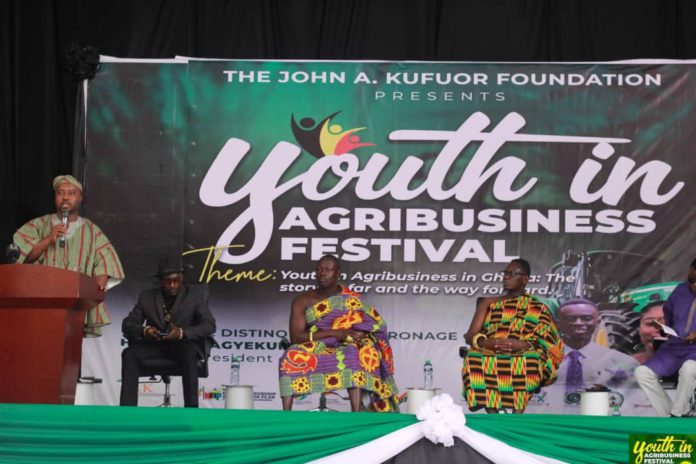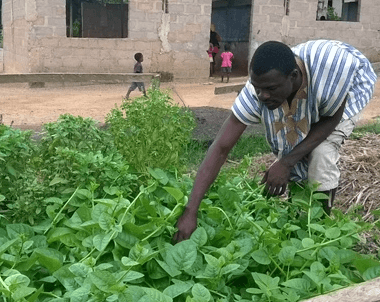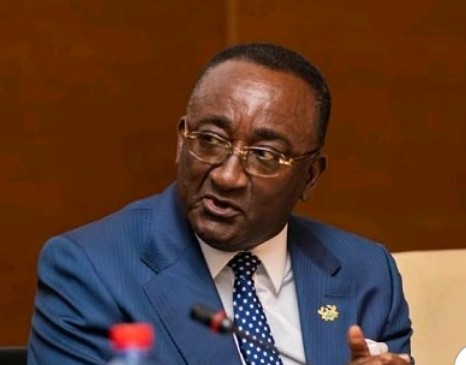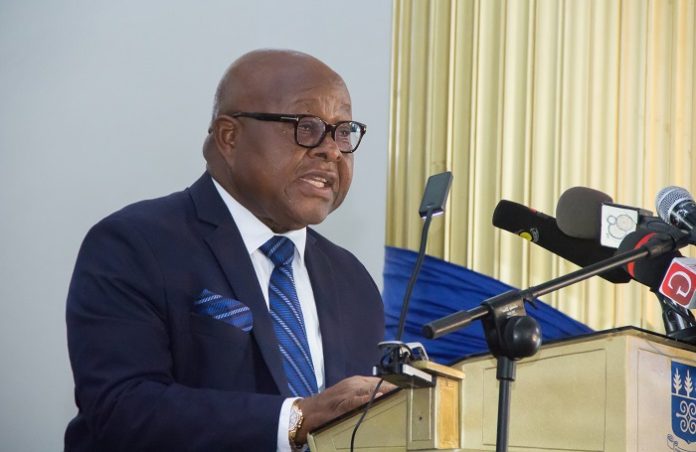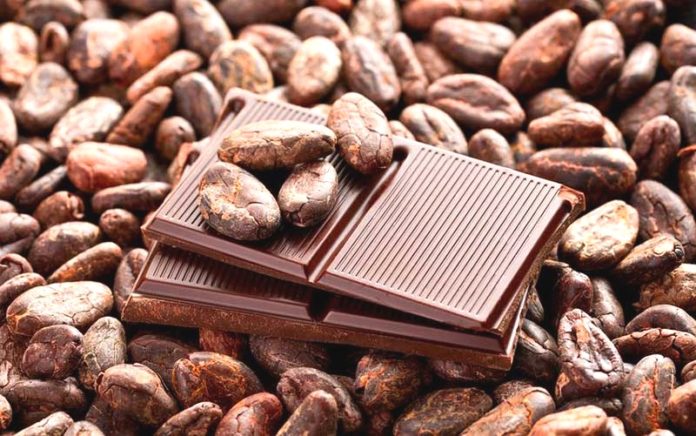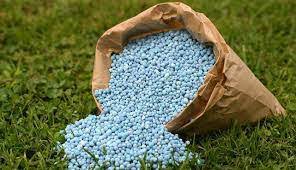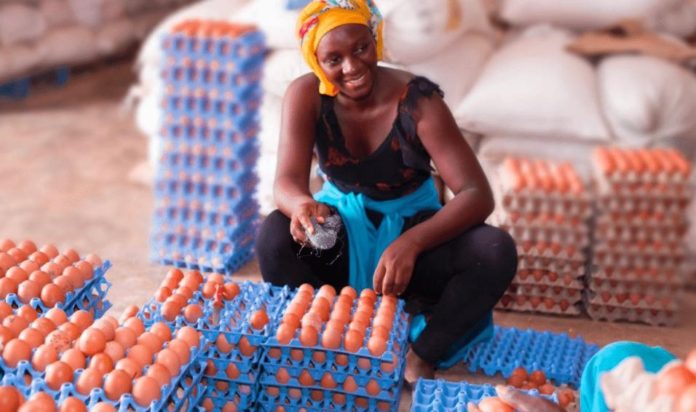Broadspectrum Limited has pledged its commitment to continuously promote the agribusiness sector and play a key role in attracting the youth to venture into the Agribusiness Value Chain. The organization donated to the maiden edition of the Youth in Agribusiness Festival, held by the John A. Kufour Foundation in Kumasi on the 27th-29th July 2022.
Backyard farming: a creative solution to a serious problem – expert.
With the rising cost of living and record inflation rates, food insecurity is set to peak in Ghana and the world over.
TCDA sets to launch 5-year strategic and implementation plan.
The Tree Crops Development Authority (TCDA), under the Ministry of Food and Agriculture, is set to launch an ambitious five years Strategic and Implementation Plan geared toward the development of a competitive and sustainable tree crops industry in Ghana.
The Former Speaker of Parliament, Ocquaye laments Ghana’s dependence on imports.
Former Speaker of Parliament, Professor Aaron Mike Ocquaye, has called for a ban on the importation of some selected products including foreign juice, chicken and other agric products.
According to him, the country ought to restructure its economy to be self-reliant in terms of feeding itself.
Speaking at the launch of the 60th anniversary celebration of the Department Of Political Science at the University of Ghana on Friday, July 22, Professor Mike Ocquaye wondered if citizens will be left to perish if something bigger than Covid-19 and the ongoing Russia-Ukraine war, which has disrupted global supply chains, occurs.
He asked that companies that are into agriculture be given special attention in order to curtail postharvest losses.
“We should look at our agro-based industries to process, store and distribute food, juices etc. How can the mangoes [be] rotten in Mangoase, Dodowa etc and the other fruits in other parts of Ghana rot whiles we languish? We need to industrialize.
“Produce more by agric and preserve them. Ladies and Gentlemen, this brings us to the WTO [World Trade Organisation] arrangement which allows the free dumping of finished products in the developing nation. No industrialized nation in the world today by its history grew to that status without isolating itself.
“Therefore, by way of serious political economy studies, we should have to close our gates and lock out all these products that are dumped upon us as against the directives of the WTO. I emphasize that the right to protect infant industries is a global human right. Foreign juices, foreign chicken and other agric products should be banned to save our nations here in Africa,” Professor Mike Ocqu
Cocoa beans, cocoa products’ export value forecast to increase in line with positive demand this year.
The export value of cocoa beans and cocoa-based downstream products is expected to continue to increase this year after recording an encouraging increase last year, following the positive trend of demand for local products abroad.
The Deputy Minister of Plantation Industries and Commodities Datuk Seri Dr Wee Jeck Seng said the export value of cocoa beans and cocoa products increased 9.6 per cent to RM6.87 billion last year compared with RM6.27 billion in 2020.
“This year, from January to May alone, as much as RM3.2 billion in export value has been recorded, proving that this sector has potential,” he told reporters after officiating the Tanjung Piai chocolate entrepreneurship centre here today.
Among the cocoa-based downstream products that are in high demand are cocoa powder, cocoa paste and chocolate products with great demand coming from the Middle East and ASEAN countries.
We said various programmes have been created by the government through the Entrepreneur Development Programme for Homemade Chocolate under the Entrepreneur Development Project for Homemade Chocolate and the Cocoa Promotion Programme in the 12th Malaysia Plan to produce more entrepreneurs and high-value cocoa-based local products.
He said the programme has successfully developed 242 handmade chocolate entrepreneurs across the country so far. Therefore, he said the newly opened entrepreneurship centre is expected to help in generating local income, especially for the B40 group and also the youth.
“This entrepreneurship centre is the first to be developed in collaboration with the Malaysian Cocoa Board (LKM) and the Institute of Malaysian Plantation and Commodities (IMPAC).
“Anyone who is interested, we will give them training. We want to produce valuable entrepreneurs using the right business model so that when they go through training from one level to the next, they will create a product and give a good return,” he said.
He said the course participants would be given exposure to handmade chocolate-making skills, the basics of entrepreneurship as well as assistance in marketing and selling products at the same premises as a kick-start support service to become a chocolate entrepreneur.
“At the initial stage of implementation, this centre is scheduled to guide as many as 300 potential entrepreneurs. “This centre is able to create opportunities to generate income for the B40 people in this area who are interested in venturing into the handmade chocolate manufacturing industry,” he added.
Fertiliser prices rise again.
Poor smallholder farmers may jointly be contributing K323 billion towards the Affordable Inputs Programme (AIP) in the coming growing season, a jump from K52 billion amidst continued rising fertiliser prices.
Our spot checks in agro-shops show that prices of AIP targeted CAN and Urea have jumped further from around K50 000 two months ago to between K55 000 and K65 000, a development which the Fertiliser Association of Malawi (FAM), an umbrella body of fertiliser suppliers has confirmed.
The increase is attributed to the 25 percent devaluation of the local currency and the war between Ukraine and Russia, major fertiliser supplies.
FAM chief executive officer Mbawaka Brandy Phiri said: “The prices are now between K55 000 and K 65 000 depending on the region. Southern Region is always cheaper due to lower distribution costs.
“The global market prices have been very volatile these past few months and are unpredictable. [In Malawi] prices have been affected both by the war in Ukraine and the devaluation of the kwacha.”
Calculated on the average price of K60 000 per bag, the K323 billion farmers’ contribution translates to 3.5 million AIP beneficiaries paying K92 000 each to redeem two 50-kilogramme bags.
Last growing season, a farmer only required K15 000 to redeem the two bags which government pegged at K25 000 each.
The expected increase has stirred fears that poor farmers will suffer food insecurity as they will not be able to generate funds to redeem the fertiliser.
Traditional Authority Lulanga of Mangochi said he was worried that his subjects might not afford the commodity.
“We have heard that the prices will be increased. That will pose a serious challenge to most peasant farmers who will not have enough resources to buy the fertiliser.
“Already, raising K7 500 is no mean effort for some farmers. So, what if it’s K40 000 or more. I fear most underprivileged families will struggle to make themselves food secure,” he said.
Additionally, in the 2022/23 National Budget, AIP has been allocated K109.5 billion which is a K33 billion lower than the previous year’s K142 billion.
Of the K109.5 billion, like last year, K12 billion is expected to be invested in subsidising maize seeds. This leaves the fertiliser package with a K97 billion kit.
At the current fertiliser price, to supply all the targeted farmers with the two fertiliser bags, there is a need for K420 billion, which minus the budgetary allocation leaves the farmers with the K323 billion problem.
Meanwhile, Phiri has proposed that government should free the suppliers to determine how much farmers will pay as top up.
“FAM is advocating for the government to adopt a flexible top up approach which will allow companies to determine the top up amount and force them to compete for customers on price, quality and service.
“This was done previously, and successfully so, with Fisp [Farm Inputs Subsidy Programme, the AIP predecessor]. Government can then allocate a fixed contribution to each farmer knowing that any price changes will not affect the overall AIP budget.
“Given that currently the fertiliser prices are very volatile this would be the best way to address the problem while ensuring that AIP remains a sustainable programme,”she said.
The capping of AIP fertiliser at K25 000 is widely viewed to have contributed to erratic supply in most parts of the country.
Farmers Union of Malawi chief executive officer Jacob Nyirongo also shared Phiri’s sentiments: “The mixed performance of the programme can largely be attributed to the fixing of the fertiliser price of the 50kg bag which affected availability of fertiliser on the market, especially during the 2021/2022 season.
“Malawi imports all of its fertilisers and has no control over production and transport costs. Fixing the fertiliser subsidy price puts fiscal pressure on government and affects the sustainability of the programme.
Ministry of Agriculture spokesperson Gracian Lungu said the government is expected to reform the programme’s implementation.
“We will soon announce the reforms and that will be the appropriate time for the nation to know what we have planned. What I can say is that the pricing is one of the areas that will influence some of the reform areas,” he said.
Russia is the fourth largest producer of chemical fertilisers in the world. Ukraine is also among the top 20, and Belarus is a major player too. Collectively, these three countries produce about 10 percent of the world’s nitrogen and phosphorus fertilisers, and 35 percent of the world’s potassium.
“Although Malawi imports most of its fertilisers from China, United Arab Emirates and India the global deficits will push the price up,” forecasted Mwapata Institute, a policy think tank, in its report filed in April this year.
As a way forward, Mwapata said there was need for an agreement on “AIP reforms as soon as possible to improve land, labour and fertiliser productivity for locally produced maize and legumes.
“Avoid delays in the procurement and delivery of AIP inputs for the 2022/23 season, given that fertilisers are likely to be in short supply on the world market.”
Ensure proper handling of eggs for good nutritional value – GSA to the public.
The conventional ways of handling eggs, including the sale of broken eggs for consumption, have been identified as posing public health risks.
Rainforest Alliance empowers smallholder farmers to grow and own plants to check deforestation.
After a year of introducing smallholder farmers to the Forest Watcher Mobile App, the Rainforest Alliance counts their achievement of growing and monitoring over 9,000 trees in the Sui River landscape.
CropLife to liaise with GSA to rid the market of fake agrochemicals.
As part of measures to get rid of fake and illegal agrochemicals on the market, CropLife Ghana has taken steps to coordinate with the Ghana Standards Authority (GSA) to identify hotspot areas where some of these products are heavily distributed across the country.
Excessive chemical fertiliser use degrades farmlands, affecting food security.
Chief Corporate Communications Officer-Jospong Group of Companies, Sophia Kudjordji, has revealed that excessive use of chemical fertiliser is removing nutrients from fertile lands and rendering farmlands less viable for agricultural production purposes; a situation likely to bring about food shortages in the near future.

